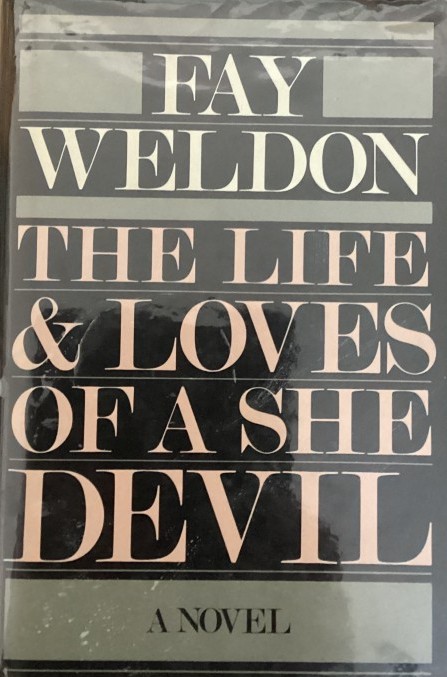Inspiring Older Readers
 posted on 29 Aug 2022
posted on 29 Aug 2022
Life and Loves of a She-Devil by Fay Weldon
I haven’t read Fay Weldon’s Life and Loves of a She-Devil since its publication in the early 1980s and returning to it now I was surprised to find just how acute and incisive the social satire remains. Weldon has written the book as if she were telling us a modern adult fairy tale - one that lays bare the way social success is measured by patriarchal notions of conformity to ‘traditional’ beauty.
Ruth Pratchett is a wife and mother and lives in the suburbs with her unfaithful husband. Ruth is a big, clumsy woman who is at pains to tell us she is ‘ugly’ – tall, big feet, hairy warts, jutting jaw – and has plenty of evidence that the world (even her pets) conspires against her. When we first meet her, she’s something of a broken woman who has come to accept all the blows society delivers her and is fully aware of her husband’s latest infatuation with romantic novelist, Mary Fisher – who is physically, spiritually and socially her polar opposite.
Although Ruth’s husband, Bobbo has treated her as a doormat for some time and is good looking enough to have had several affairs before, this time she is pushed over the edge. One day she runs upstairs a crying victim but she comes down a reinvented, self-confessed, ‘She-Devil’.
She starts by burning down the family house, dumping her children on the unwilling Mary Fisher and sets about changing her life in every way. Soon it becomes clear that not only will she turn herself into Mary Fisher, she will make sure Mary Fisher experiences what its like to live the life Ruth had before her conversion to she-devil status.
What follows is a series of picaresque encounters in which Ruth adopts a series of different personas – all of them strong, manipulative women – and sets about changing (liberating?) the lives of the people she meets while also pushing forward her own transformation.
Writing about the book in The Guardian in 2014, Paris Lees says the book had a remarkable impact on her teenage self:
“Ruth taught me that what is good is not always what is kind, and what is kind is not always what is good. The people she manipulates along her journey are all richer for having had her in their lives. Aside from her various pseudonyms, Ruth never lies – not about the important stuff. The law can be broken and documents forged, but she always has some insight about where others are going wrong. The world is full of stupid people but she doesn’t waste time arguing with them. She’s far too concerned with getting what she wants. It seems like a message to the women of the era.”
By the end of this fairy story, Ruth’s world has been inverted, Mary Fisher disposed of and her husband now in her thrall. But what does this ‘triumph’ tell us about the values of the society we live in? Is Paris Lees right in saying that Ruth’s story shows us that “the best – the only – way to exact revenge on a cruel and unjust world is to become rich, powerful and beautiful.”
Critics and commentators have been split on this novel because the messages aren’t ideologically didactic – those who want to claim it as a feminist statement struggle with the obvious lack of gender solidarity but those who just want to see it as a darkly humorous comic novel can’t deny the basic feminist underpinning of the social satire.
For me, that is a strength not a weakness of the novel and it serves to keep it relevant at a time when what seemed to be the gains of 70s and 80s feminism are on retreat. Just turn on your television and you wont have to wait long for a program in which women put themselves through grotesque levels of plastic surgery in order to achieve a body-shape ideal that promises social success and power.
It's a bit depressing really.
Paperback copies of the book are easy to find online and you’ll pay very little for one.
Terry Potter
August 2022